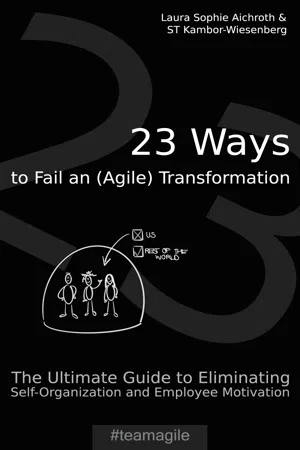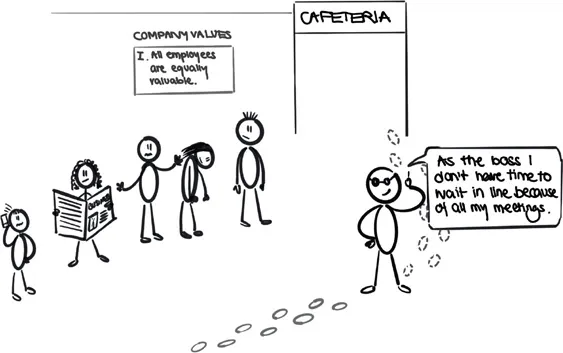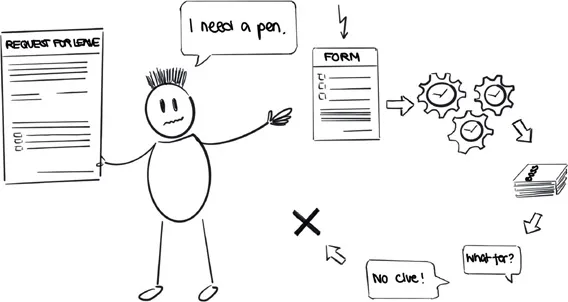
23 Ways to Fail an (Agile) Transformation
The Ultimate Guide to Eliminating Self-Organization and Employee Motivation
- 76 pages
- English
- ePUB (mobile friendly)
- Available on iOS & Android
23 Ways to Fail an (Agile) Transformation
The Ultimate Guide to Eliminating Self-Organization and Employee Motivation
About this book
Laura & ST have been supporting individuals, teams and companies in (agile) change projects for many years. Sometimes this has been very disappointing and frustrating. As a self-therapeutic measure, they began to write short messages in which they satirized or simply quoted their environment. Comments like: "You can do that any way you like, but not like that" or "Testing? We don't do that, it's far too expensive. We implement changes live" or "This is a very good method, but unfortunately it doesn't work for us" or "In the time planning takes, I can also work on something for real" brightened the depressed mood. In the course of time, small drawings were added and the idea for this book was born. To make sure the content is not only negatively connotated, they have described improvement suggestions with each anti-tip.
Frequently asked questions
- Essential is ideal for learners and professionals who enjoy exploring a wide range of subjects. Access the Essential Library with 800,000+ trusted titles and best-sellers across business, personal growth, and the humanities. Includes unlimited reading time and Standard Read Aloud voice.
- Complete: Perfect for advanced learners and researchers needing full, unrestricted access. Unlock 1.4M+ books across hundreds of subjects, including academic and specialized titles. The Complete Plan also includes advanced features like Premium Read Aloud and Research Assistant.
Please note we cannot support devices running on iOS 13 and Android 7 or earlier. Learn more about using the app.
Information
CHAPTER I
Management and General Demotivation
Don't practice what you preach!

- Be punctual - Plan appointments in your calendar and make them end five before and begin five after, so that you are prepared in any case, can prepare yourself mentally for the next appointment, arrive on time and have already fetched a coffee.
- Always come prepared for appointments - Block times in your calendar to prepare for appointments and always invite to appointments with goal and agenda. We stubbornly ask for goals and agendas for all appointments, help shaping them and clarifying in advance what should be worked on or discussed in the appointment. In case of doubt, we consistently cancel appointments without goals and agenda if the inviting parties don't want goals and an agenda.
- Document properly. Knowledge is power - That is a religious but very common doctrine. People in organizations get sick, go on vacation or change jobs. Document for yourself and others to a degree that the work could continue without you. Allow others to find information in familiar, unambiguous places without having to ask you. You will find that it will save you a lot of time and nerves if those who are interested can meet their - somewhat overworked term - debt to be collected (in German Holschuld).
- Stick to time boxes - Decisions that are not made within 55 minutes will not be made in 65 minutes. Always keep an eye on the time for a task or appointment and actively drive decisions and the agenda forward, even if you don't lead the appointment. Once the goal has been achieved and the agenda has been completed, everyone is happy to have time left and to devote themselves to new tasks. If there is not enough time to reach the planned goal, arrange a follow-up appointment. It is important to take an active part and to notice in time when there is not enough time. If 50 minutes and 10 agenda items are planned for the meeting and point 2 is still being discussed after 30 minutes, something has to be changed, e.g. five minutes of discussion per item. If there is no decision on the point, it must be decided whether to adjourn this point or another.
- Be focused - On all tasks. Don't eat, turn off your smartphone /mute it, put away anything that might distract you. We humans are not made for simultaneous activities. We are better if we concentrate on one task, complete it and tackle the next. Interruptions always result in the sum of the individual attempts to complete a task taking longer than to complete the task in one go. Furthermore, the probability of errors increases. It's better to take more conscious breaks and then focus again.
- Be honest - In lectures, at trade fairs, at recruiting events or in marketing campaigns. Not telling the truth is just a very expensive loan with uncertain side effects. If you have lost the trust of your employees, it is very difficult to get it back. And what applies to your employees also applies to customers. Don't promise anything that doesn't exist (yet). Even if you don't tell an untruth directly, but only give the impression of something that doesn't correspond to the truth, this will eventually lead to disappointed expectations.
Make it harder to spend money!

- Transparent cost centers and budgets (easiest per team) for office supplies, software licenses, etc.
- Clear criteria for the use of further training with the agreement to pass on the acquired knowledge to other colleagues. Define the format of transferring the knowledge before the booking of the training. Then the conditions are transparent for everyone.
- Processes that are accessible to everyone. If a central procurement has been placed, the person placing the order must b...
Table of contents
- About the book
- About the author
- Table of Contents
- Prologue
- Chapter I: Management and General Demotivation
- Chapter II: Agile Washing
- Chapter III: Human Resources and Attitude
- Chapter IV: Software Developers and IT
- Chapterl V: Product Development and Customer Contact
- Copyright